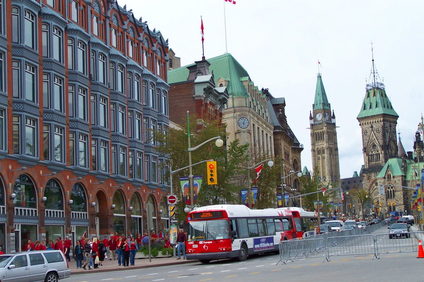
Sierra Advises Senior Officials on Rebuilding Canada’s Environmental Leadership
If Canada is to re-establish itself as a global leader in environment and sustainability, a great deal will depend on the public servants who step up to implement the new government’s policies.
Last Thursday, I got a snapshot of how their role might take shape when I was invited to speak to a gathering of senior executives from many of the key departments in Official Ottawa.
To translate a new set of public policies into real results, a government needs a civil service with the knowledge and capacity to deliver on promises made. “If you have built castles in the air, your work need not be lost,” wrote the beloved naturalist, Henry David Thoreau. “That is where they should be. Now, put the foundations under them."
Getting the Job Done
Last week’s session was hosted by the Institute on Governance, and I spoke alongside panelists on international relations, Aboriginal affairs, digital media, and science and technology policy. The discussion started out with a stark reality: about half of Canada’s civil servants have only worked for one government, so the change in approach and underlying philosophy will be a new experience for them.
One of the most important discussions centred on public consultation, a muscle that they noted had atrophied in the civil service over the last decade.
I told them about the Canadian Environment Network, which used to receive federal funding to manage a transparent, accountable process for the government’s consultations with environmental organizations.
I brought them back to the days when civil society representatives were included in Canadian delegations to international meetings, including many of the annual conferences leading up to this year’s climate change summit in Paris.
I also talked about the structural changes that have taken $50 billion per year out of the government’s coffers. Repairing the system to recapture those dollars will be difficult. Delivering on the new government’s promises will be frightfully difficult without adequate funds.
Bringing Environment In from the Cold
The senior public servants in the room were receptive to the need to shift the way federal policy balances the environment and the economy.
Our country has treated economics as a singular, driving force in recent years when it should actually be seen as a powerful tool for a society that respects the environment. Economic “laws” are shaped by people, and too often, by their ideologies. The immovable laws of nature create the context in which all human activity occurs, setting the limits within which we organize our culture, traditions, institutions, governance, relationships…and economy.
I also urged the participants to expand their focus from environment to sustainability. Canada did not engage very significantly when the United Nations updated its Sustainable Development Goals. But the final version—which was adopted just this fall— and applies to all countries—can be part of the roadmap for a renewed Canadian commitment to:
- Reduce inequality within and among countries
- Ensure sustainable consumption and production patterns
- Take urgent action to combat climate change and its impacts
- Conserve and make sustainable use of marine and land-based ecosystems
- Combat desertification and land degradation, and promote biodiversity
- Promote peaceful, inclusive societies, with justice for all and effective, accountable institutions at all levels.
All of which sounds an awful lot like the Canada that 70% of us wanted when we went to the polls October 19.
Rebuilding Democracy and Trust
Rebuilding trust with Canadians will be one of the most important tasks for the government and the public service. I don’t think anyone who attended last week’s panel was inclined to underestimate the challenge.
We talked about how badly civil society organizations in Canada have been vilified by government over the last decade. Discussion centred on the need for a civil society discourse on environment and sustainability, and for the government to listen to, respect, and value that dialogue.
Rebuilding democracy and trust will mean bringing evidence and science back into the decision-making process, and restoring an environmental assessment process that has been gutted.
And of course, climate change must move to the centre of the policy agenda, with affordable renewable energy recognized as the cutting edge of a suite of climate solutions. I found it quite striking that the international affairs specialist on the panel spoke only about climate change, identifying it as the top priority for the Department of Foreign Affairs. He only broadened his focus in response to specific questions from the moderator.
Restoring a Canadian Legacy
When it comes to bringing environment and sustainability to the centre of Canadian policy-making, what’s old is new.
Environmentalists tend to look back to Progressive Conservative Brian Mulroney as the best environmental prime minister the country has ever had. Sustainability was high on his agenda. His government got results on several key environmental files. The approach often transcended partisanship, tackling big problems that went beyond politics.
Canada was also a global pioneer in developing multi-stakeholder consultation processes where participants could take off their organizational “hats”, find common ground, and work diligently toward win-win solutions. Beyond the detailed, thoughtful research the organization produced, that’s the legacy that was lost when the previous government shuttered the National Round Table on the Environment and the Economy.
So while it will take a lot of effort (from all of us) to rebuild Canada’s environmental and democratic systems, much of the work will involve remembering and re-creating things we’ve lost. By the end of last week’s panel session, I think everyone in the room was optimistic that we can get the job done.
Join us in helping to ensure that our civil service has the necessary tools to turn government policies into tangible results. Please consider making a donation today.
Sincerely,
Diane Beckett
Interim Executive Director
dianeb@sierraclub.ca • (613)241-4611
One Earth • One Chance
SCCF's success depends on the support of like-minded individuals and organizations. Donate today.

